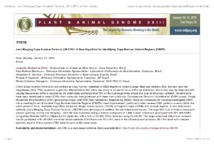Java Merging Copy Number Variants (JM-CNV): a new algorithm for identifying Copy Number Variant Regions (CNVR).
Java Merging Copy Number Variants (JM-CNV): a new algorithm for identifying Copy Number Variant Regions (CNVR).
Author(s): SILVA, J. M. da; ROMANIUC, A. R.; CAETANO, A. R.; GIACHETTO, P. F.; YAMAGISHI, M. E. B.
Summary: CNVs (Copy Number Variations) are defined as copy number variations of DNA fragments typically larger than one kilobase (Kb), but less than five megabases (Mb). They represent a genomic disequilibrium that alters the ploidy in a specific locus within an individual, which may also be observed with varying frequencies within a population. An initial study estimated that 12% of the human genome shows this type of structural variation. Reliable tools have been developed to detect CNVs from molecular data produced with three main platforms: Comparative Genomic Hybridization (CGH) arrays, Single Nucleotide Polymorphism (SNP) genotyping arrays, and DNA Next-Generation Sequencing (NGS). However, processes for merging overlapping CNVs into a meaningful set of discrete Copy Number Variable Regions (CNVRs) need improvement, particularly when several CNV patterns co-exist within the same genomic locus. Available algorithms frequently merge noncontiguous CNVRs or fragment large CNVRs into multiple regions. A new web-based software (Java Merging Copy Number Variants: JM-CNV) was developed to address the aforementioned issues.
Publication year: 2015
Types of publication: Abstract in annals or event proceedings
Observation
Some of Embrapa's publications are published as ePub files. To read them, use or download one of the following free software options to your computer or mobile device. Android: Google Play Books; IOS: iBooks; Windows and Linux: Calibre.
Access other publications
Access the Agricultural Research Database (BDPA) to consult Embrapa's full library collection and records.
Visit Embrapa Bookstore to purchase books and other publications sold by Embrapa.

